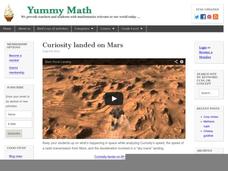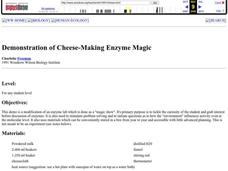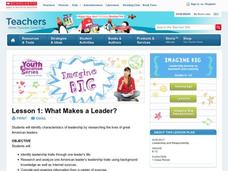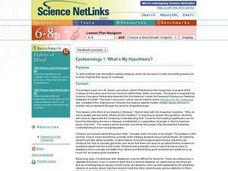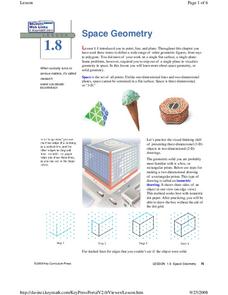Yummy Math
Curiosity Landed on Mars
Out of this world math and science are mixed together on a worksheet that would be a great enrichment activity classrooms that are studying our solar system. The information presented is best suited toward middle school math, and...
Curated OER
Concrete for Kids
Although preparation-intensive, this would be an unforgettable experience in materials engineering. Stimulate learners' curiosity with a slide show and then introduce them to the components of concrete. Small groups mix and pour concrete...
Curated OER
Houston, We Have a Problem! An Introductory Lesson for the unit Stars, Galaxies and the Universe
The lesson plan would make a stimulating introduction to a space unit. It is highly imaginative and suggests that the teacher darken the room to set the mood and dress as an astronaut. Teams are asked to help solve an imaginary problem...
Curated OER
Electricity and Magnetism: From Fun to Function
Fourth graders experiment with electricity and magnetism and build an electromagnetic motor. In this electromagnetism lesson, 4th graders use household objects to show electrostatics and magnets and compasses to show magnetism. They...
Curated OER
Demonstration of Cheese-Making Enzyme Magic
Students watch a demo which is a modification of an enzyme lab which is done as a "magic show". It's primary purpose is to tickle the curiosity of the student and grab interest before discussion of enzymes. It is also used to stimulate...
Curated OER
Demonstration of Cheese-Making Enzyme Magic
Students participate in a modified demo enzyme lab, a "magic show." The purpose of the demo is to tickle the curiosity of the student and grab their interest before discussions of enzymes. Its purpose is also to stimulate problem solving...
Curated OER
Animal Alphabet
Second graders identify animals with each letter of the alphabet. In groups, they create a PowerPoint presentation which shows the information they have collected about each one. Using all of this information, they create an animal...
Curated OER
Cooking Up an Explanation
Students pose scientific questions about food items and research their explanations. They then create recipe cards with the answers and present their findings in a cooking show format.
Curated OER
Make Sense of Nature
Students participate in this program that heightens their awareness and curiosity of nature as well as their sense of adventure and exploring new surroundings. They identify and choose an object from nature after exploring it with other...
EngageNY
Interpreting the Graph of a Function
Groups sort through NASA data provided in a graphic to create a graph using uniform units and intervals. Individuals then make connections to the increasing, decreasing, and constant intervals of the graph and relate these...
Curated OER
Science as a Catalyst for Life-Long Learning
Students determine the minimal inhibitory concentration and the minimal fungicidal concentration of two types of drugs used to combat fungal infection. They use several different types of in vitro techniques which are performed in the...
Scholastic
What Makes a Leader?
After creating a list of great American leaders from the last century and researching their lives, pupils will brainstorm aspects of leadership and discuss what traits may be shared by all leaders.
Curated OER
Remember This?
Students investigate the mechanics of an fMRI and the properties of neurons. In this biology instructional activity, students analyze the way the brain works by performing tests in the neurons in the brain. This is all done theoretically.
California Academy of Science
Notice and Wonder
Pint-sized zoologists practice the art of observation. They take notes, pictures or written, as they observe an animal for a period of time. This can be done at the zoo, with a visiting classroom animal, or perhaps at the humane society....
Curated OER
Refining the Why? Turning Student Questions into Research
Middle schoolers have years of experience when it comes to how their bodies work. Surely they have some questions as well. Here is an opportunity for them to practice the scientific method in an attempt to answer some of those questions....
Curated OER
Epidemiology 1: What's My Hypothesis?
Students demonstrate how descriptive epidemiological clues can be used to make educated guesses as to what might be the cause of a disease.
Curated OER
Space Geometry
Students explore points, lines and planes as it relates to geometry. In this geometry lesson, students analyze space and explain wy it is 3-D and not flat or 2-D. They solve problems involving volume and 3-D shapes.
Curated OER
Getting the Dirt on Soils
Students examine soils and the components that make them up. In this hands-on soil science activity, students receive soil samples and must identify the various aspect which make up soil.
Curated OER
Reaction Reasoning
Third graders experiment with chemical reactions and examine what happens to the atoms when different reactions occur. In this matter lesson students divide into groups and complete a lab experiment.
Curated OER
Water: Liquid or Solid?
First graders investigate how water can be both a liquid and a solid. They weigh popsicles and observe them as they write in their science journals. They measure the liquid as the popsicle melts and refreeze them to change them back...
Curated OER
Space
First graders examine space in this unit of lessons. They create a KWL chart and write in their journals about space. They also examine the phases of the moon and identify the constellations.
Curated OER
Exploring the Night Sky: Fall/Winter
Students explain how moon phases occur. They explain three ways that the night sky has been used through history. Students locate some of the constellations in the night sky. They discuss stories and myths surrounding stars.
Curated OER
Study of Projectile Motion using Straw Rockets
Learners design and launch their own rockets. In this experimental activity students launch their own rockets and record the various angles and distance that they go. Each student has time to redesign their rocket and have a...
Curated OER
Are We Alone
Seventh graders collect/analyze data and draw conclusions; support reasoning by using a variety of evidence; construct logical arguments; access information at remote sites using telecommunications; apply the concept of percent;...
